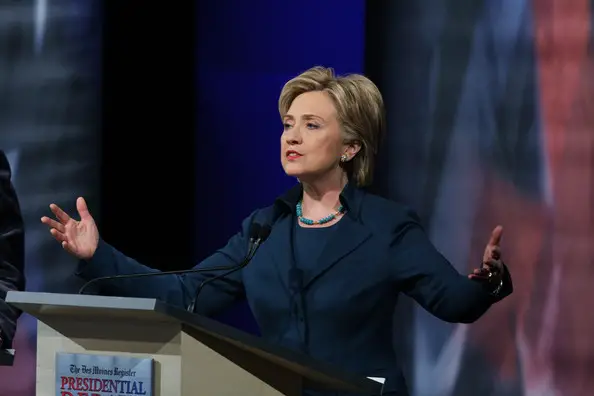After months of delays and promises about more details coming soon, the Democratic National Committee has put forth the dates which will fill out a lean schedule of only six debates. Not surprisingly, several Democratic contenders wasted no time in condemning the schedule as being unfavorable to candidates other than Hillary Clinton. The first Democratic debate won’t be happening until mid-October, followed by one in November, December, January, and two in either February or March.
Here’s the condensed version. See our full 2016 Democratic Debate schedule for further details.
October 13, 2015 – CNN Democratic Debate (Nevada)
November 14, 2015 – CBS Democratic Debate (Iowa)
December 19, 2015 – ABC Democratic Debate (New Hampshire)
January 17, 2016 – NBC Democratic Debate (South Carolina)
Feb or March, 2016 – Univision Democratic Debate (Miami, Florida)
Feb or March, 2016 – PBS Democratic Debate (Wisconsin)
Report from Politico:
The lineup itself does not come as a surprise for Democrats, but for the candidates who wanted more debates to come sooner, the fact that only four will occur before the Iowa caucuses in February is a disappointment.
“These six debates will not only give caucus goers and primary voters ample opportunity to hear from our candidates about their vision for our country’s future, they will highlight the clear contrast between the values of the Democratic Party which is focused on strengthening the middle class versus Republicans who want to pursue out-of-touch and out-of-date policies,” DNC Chairwoman Debbie Wasserman Schultz said in a statement.
The party first announced in May that it would host six debates involving the candidates, a pack that’s now made up of front-runner and former Secretary of State Hillary Clinton, Vermont Sen. Bernie Sanders, former Maryland Gov. Martin O’Malley, former Virginia Sen. Jim Webb, and former Rhode Island Sen. and Gov. Lincoln Chafee.
Vice President Joe Biden’s chief of staff has also been included on communications from the DNC about debate planning, but the Biden team has yet to chime in as Biden weighs his options.
The DNC said on Thursday that to qualify for a debate, candidates must get at least 1 percent in three credible national polls within the six weeks before the debate — a threshold that could make Webb, Chafee, and O’Malley’s camps nervous.
Campaigns started griping about the plan soon after the party committee announced it three months ago — the Sanders and O’Malley camps publicly said they wanted more than six debates, while Clinton’s team initially lobbied for even fewer. [Emphasis added]
In the intervening months, some of the complaints burst into the open. The Clinton camp has stayed quiet, but Sanders sent a letter to Wasserman Schultz in June asking for more events, sooner — including some that involve Republicans — and O’Malley railed against the process while campaigning in Iowa on Wednesday.
“To those in Washington who think they can limit the number of debates that we’re going to have before the Iowa caucuses, can circle the wagons and close off debates: I think they’re going to have another thing coming when they talk to the people of Iowa,” the Marylander said in Cedar Rapids, telling The Hill newspaper that he had personally complained to Wasserman Schultz last week.
O’Malley’s campaign went further on Thursday morning, when chief strategist Bill Hyers circulated a statement accusing the DNC of making the process “less democratic” by limiting the number of debates. The campaign then sent out a fundraising email to its supporters carrying a similar message within minutes.
A few hours later, Sanders chimed in: “I am disappointed, but not surprised, by the debate schedule announced by the Democratic National Committee,” he said. “At a time when many Americans are demoralized about politics and have given up on the political process, I think it’s imperative that we have as many debates as possible — certainly more than six.”
I emphasized the point in that story about how O’Malley, among others, want more than six debates, while Hillary Clinton’s team wanted even less than that. I believe this is going to cause a serious uproar within the Democratic Party given how long it will be until the candidates challenging Hillary will finally get some time in the spotlight on the debate stage. Then when it finally does begin, it’s worth noting the debates in November and December take place on Saturday, while the January debate is on a Sunday. Thus, they will not be primetime weeknight events which will garner the most number of viewers. Instead they will compete with college football on Saturdays, or professional football on the Sunday date.
Donate Now to Support Election Central
- Help defend independent journalism
- Directly support this website and our efforts
